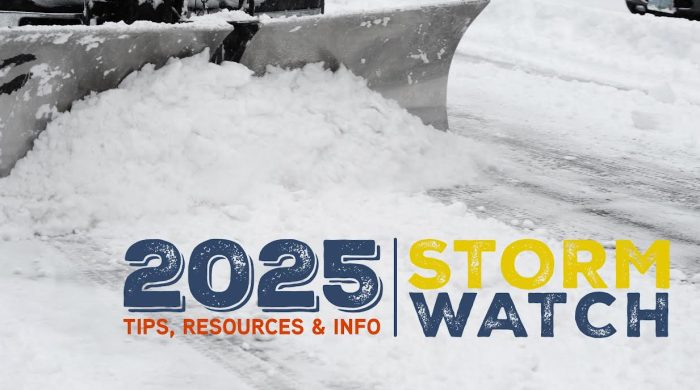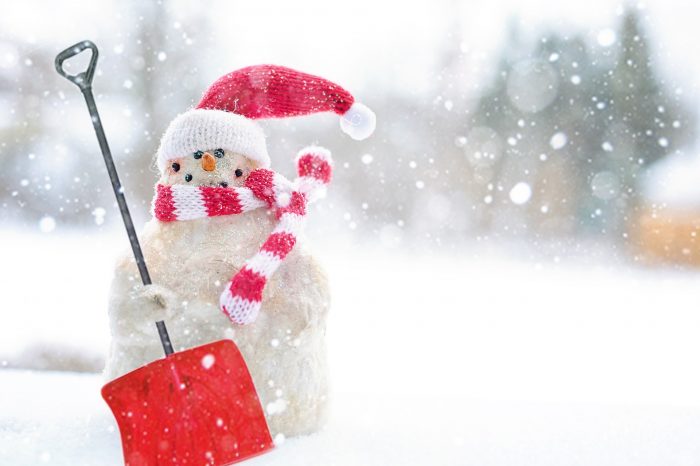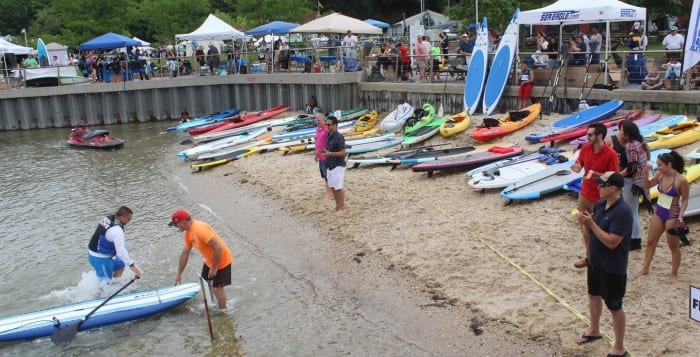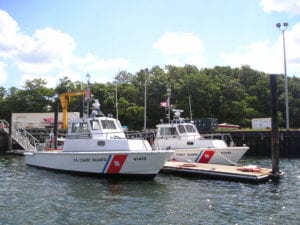According to the National Weather Service, a winter storm watch will go into effect Saturday, Feb. 8 at approximately 7 p.m. through Sunday, Feb. 9 ending at 11 a.m.
A heavy mixed precipitation is possible. Total snow and sleet accumulations are expected to be between three and five inches and a light glaze of ice accumulations is possible. Travel conditions may become difficult during the storm, especially as temperatures fluctuate causing slick roads. If possible motorists should avoid driving during the storm. If travel is absolutely necessary, drive with extreme caution, warns Town of Smithtown Supervisor Edward Wehrhreim.
The Town Smithtown Highway Department Fleet will begin working Friday evening on prep, applying a beet juice brine to the roads and sidewalks to prevent dangerous black ice conditions. Snow removal crews will continue to work through the duration of the storm.
Park Vehicles in the Driveway: Residents are encouraged to keep vehicles off the curbside as plows clear the residential areas in an expeditious manner. Smithtown’s highway fleet began work overnight applying a beet juice brine to the roads and sidewalks to prevent icing.
Parks & Beaches Will Be Closed During the Storm: In an effort to keep residents safe and allow for Parks, Buildings & Grounds to remove snow from parking lots efficiently, gates and other access to the parks and beaches will be closed on Saturday and Sunday.
Stay Informed: Residents can stay informed about the storm and get up to the minute updates via the Town of Smithtown Mobile App, which is free to download on Google Play and the App Store.
The Town of Smithtown has compiled a list of tips, resources and information regarding the storm, the cleanup process, reporting power outages and the proper contact information for those in need of further assistance.
PUBLIC SAFETY:
The Department of Public Safety has activated the Emergency Operations Center (EOC) and is coordinating efforts with Suffolk County and PSEG in the event of power outages. Public Safety is urging residents to stay off of the roads, which lessens the potential for accidents. Use extreme caution and if you must travel, please do so with a winter survival kit. In the event, you become stranded, stay with your vehicle and call authorities. All non life-threatening calls can be directed to the department of public safety by calling (631) 360-7553.
Elderly Neighbors & Special Needs individuals: Please check on your neighbors with disabilities, special needs or senior citizens. Make sure they have an emergency phone, plenty of water, food and blankets. Ask if they have someone to call in the event of an emergency. If further intervention is required please contact the Office for People with Disabilities at (631) 360-7642.
Animals & Family Pets: All domestic animals should remain indoors in below freezing temperatures, with the exception of allowing dogs to venture out briefly to go to the bathroom. Make sure to check the yard for broken fences or open gates and if possible keep an eye on your pets while outdoors to avoid escape, and injuries.
Please Note: It is against the law to leave pets outside in freezing conditions such as these! If you witness cruel conditions, please report it. Farm animals should be sheltered indoors for the duration of this storm. To report animals in distress, strays or other loose domestic or wild animals please call the Smithtown Animal Shelter (631) 360-7575.
Post Storm Safety: When plowing driveways please be cognizant not to block fire hydrants with snow mounds. Public Safety Fire Marshals ask that residents using generators be cognizant to place the exhaust facing outwards and at least 20’ away from a building. This can protect loved ones from CO poisoning and can prevent fires caused by generators incorrectly positioned.
Power Outages – PSEG Information: View PSEG Long Island’s outage map Click Here
To report and receive status updates on an outage Text OUT to PSEGLI (773454) or to report an outage online visit www.psegliny.com
To register, have your account number available and text REG to PSEGLI (773454)
Downed wires should always be considered “live.” Do not approach or drive over a downed line and do not touch anything contacting the wire. To report a downed wire, call PSEG Long Island’s 24-hour Electric Service number: 1-800-490-0075.
Road Preparations and Snow Cleanup:
Superintendent of Highways, Robert Murphy reports that the full fleet has been deployed for the duration of the storm. As a reminder, please remove any waste bins, brush or leaf bags from the curbside and park vehicles in driveways so the roads can be plowed efficiently during and after snow accumulation. This also prevents damage to curb cuts, mailboxes and driveways.
To report icing, and other issues related to conditions along the roads, please contact the highway department at (631) 360-7500.
USEFUL NUMBERS:
Stranded Vehicles: If there is an emergency, please dial 9-11 immediately. All non life-threatening calls can be directed to the Department of Public Safety by calling 631-360-7553
Local Fire & Police Phone Numbers: In an emergency dial 9-1-1
- Suffolk County Police Department: For non-emergencies, contact 631-852-COPS (2677). Dial 9-1-1 ONLY for life-threatening emergencies.
- Smithtown Fire Rescue Communications: 631-265-1500 for fire and EMS emergencies in the Smithtown, Kings Park, and Hauppauge Fire Districts.
- Suffolk County Fire Rescue and Emergency Services: Dial 911 for fire and EMS emergencies in the St. James, Nesconset, and Nissequogue Fire Districts.
- Commack Fire Department: 631-499-5777 for fire emergencies in the Commack Fire District.
Report Power Outages to PSEG: Text OUT to PSEGLI (773454), report it online at MyAccount.psegliny.com, through the PSEG app, or call1-800-490-0075
Report Gas Outages or Emergencies: If you smell gas anywhere, including in your home, go outside and call National Grid 24 hour hotline at 1-800-490-0045 or dial 911 immediately.
LIRR Commuter Travel Information: For information regarding delays or travel questions, contact the LIRR 24 hour travel information center at 718-217-5477
Suffolk 311: Suffolk County 311 is a central call center available to residents who do not know which number to call for any non-emergency. Residents can reach the 311 line Monday through Friday from 9 a.m. to 4:30 p.m. or leave messages after hours.
Elderly Neighbors & Special Needs individuals: For assistance with elderly or special needs individuals, contact the Office for People with Disabilities at (631) 360-7642
Animals & Family Pets: To report animals in distress, strays or other loose/lost domestic or wild animals please call (631) 360-7575. To Report Animal Abuse, or Neglect contact the Suffolk County SPCA at (631) 382-7722 or Suffolk County Police at (631) 854-8200.
Winter pet safety tips – can be found online at the Suffolk County SPCA by visiting suffolkspca.org/information/









